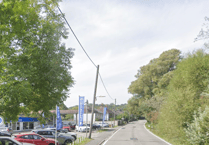New flightpaths for Farnborough Airport were introduced in 2020 during Covid and a year-long review of the impacts is being carried out at the moment.
Areas south of Farnham previously had five to ten flights a day flying over them. But since the new flightpaths, there are frequently more than 100 – and many aircraft are flying lower, which creates more noise.
The private jet market is booming and the airport has seen 17 per cent growth in the past year.
As a result, the airport is about to apply for an increase in weekend flights and a planning application has been submitted for a second terminal.
It is hard to see how the UK is moving to reduce greenhouse gas emissions while growing the private jet market as they are 20 to 40 times more polluting than a commercial flight.
The UK is the highest private jet polluter in Europe and countries like France and Netherlands are introducing legislation to reduce their use.
So it is important the impact of the flightpath change is assessed properly. The problem is that it isn’t.
The main issue raised by the public when the airspace change was proposed was noise. Only last year the CEO of the Civil Aviation Authority committed to Jeremy Hunt MP that noise would be measured in the year-long review. It hasn’t.
Pollution isn’t being measured either, despite class actions being taken out against airports in the USA for high levels of harmful ultrafine particles.
But maybe the most infuriating issue is the undemocratic way the process is being run.
The airport has an army of paid employees that it used to produce a 417-page report over many months. Councils are in no position to evaluate a large technical aviation report which is why Farnborough Noise Group has carried out an evaluation of it.
It took 14 days to do this with people volunteering their time during evenings and weekends.
The deadline for responses from councils to the Civil Aviation Authority is June 26.
But there are many new councillors following the recent elections who are unaware of the airspace changes and the fact council meetings happen only once a month – and require a month to get an item on the agenda – means councils cannot respond to the report in time.
The government is now consulting on changes to all UK airspace to double the number of aircraft by 2030. This will have a huge impact on millions of people, especially in this area.
The same process and timescales will be used for this evaluation that were used for Farnborough’s changes.
If we really do live in a democracy and people are to have faith in the evaluation of things that impact us, they need to be done properly rather than the public and their elected bodies being steamrollered and their views ignored.





Comments
This article has no comments yet. Be the first to leave a comment.